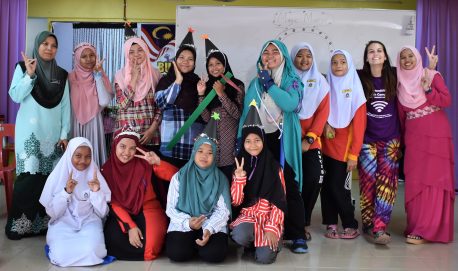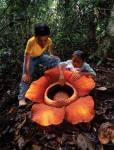My fabulous mom is a middle school “gifted” teacher. She’s planning to keep her kids updated on my Asian adventures through pictures and this blog (hooray for multicultural exposure). We might even collaborate with my future students and have them connect as pen pals! To get them started, Mom had her sixth graders send me some of their more pressing questions. Even if you don’t care about the answers, at least give the questions a look. Sixth graders are awesome.
KH: “Wil you go to china and buy an antique from one of their shops?”
I will likely travel to China at some point, but my travel plans are still a bit nebulous. I might meet a friend in Hong Kong. If so, I will now plan to buy an (inexpensive) antique. Great idea!
AL: “When did you decide to go to Malaysia?”
I decided to go to Malaysia around June of 2016. I was working at the Honors Program office at UD. When I mentioned that I wanted to go abroad after I graduated, the fellowship adviser there suggested I apply for a Fulbright grant. After considering many choices of country, I finally decided on Malaysia! I submitted my application that October, and then I had to wait until March 2017 to find out I was accepted.
AL: “Why would you rather teach in Malaysia, instead of America?”
I love traveling and experiencing new cultures, and since I just graduated and don’t have family or career obligations yet, now is a good time for me to live somewhere else. Malaysia is so different from the United States, and teaching there is a way for me to become closely involved with a community and immerse myself in their way of life.
KH: “Do you know how to speak Malaysia’s offical language?”
No, I do not know how to speak Bahasa Malaysia. I will receive two weeks of training in the language when I arrive. I know a few words and phrases though to get me by until then! Here are a few examples:
Terima kasih = Thank you
Nama saya = My name is
Selamat pagi = Good morning
Selamat tengah hari = Good afternoon
Selamat petang = Good evening
Selamat tinggal = Goodbye
SA: “How you are going to understand people?”
Luckily, many Malaysians speak English fluently or at least conversationally, so with the very basic knowledge of Bahasa Malaysia I’ll get during training, I shouldn’t have too much trouble communicating. My students will all know at least a basic level of English, so I’ll be able to conduct lessons solely in English.
KB: ” What is the currency, and what does it convert to?”
The currency in Malaysia is called ringgit. Currently 1 Malaysian ringgit is equivalent to 25 cents in the US. In other words, there are 4 Malaysian ringgit to a dollar.
FR, MF, KB: “HoW ArE YoU GoInG To GeT MoNeY???????????????????????????????????????????????????????????????????????????????????????????????????????????????????????????????????????????????????????????????????????????????????????????????????????????????😀😂☺🛫😶😙😚📲😀😂☺🛫😶😙😚😍📲😀😂☺🛫😶😙😚😍📲😀😂☺🛫😶😙😚😍📲😀😂☺🛫😶☺🛫☺🛫☺🛫☺🛫☺🛫☺🛫☺🛫☺🛫☺🛫☺🛫☺🛫☺🛫☺🛫☺😁😁😁😁😁😁😁😁😁😁😁😁😁😁😁😁😁😁😁😁😁😁😁😁😁😁😁😁😁😁😁😁😁😁😎😎😎😎😎😎😎😎😎😎😎😎😎😎🤔🤔🤔🤔🤔🤔🤔🤔🤔🤔🤔🤔🤔🤔🤔🤔🤔🤔🤔🤔🤔🤔🤔🤔🤔🤔🤔🤔🤔🤔🤔🤔🤔🤔🤔🤔🤔🤔🤔🤔🤔🤔🤔🤔🤔🤔🤔🤔🤔🤔🤔🤔🤔🤔🤔🤔🤔🤔🤔🤔🤔🤔🤔🤔🤔🤔🤔🤔🤔”
The Malaysian-American Commission On Educational Exchange (MACEE) will set up a bank account for me in Malaysia, and every month they will put money in my account. It will be enough to cover living expenses, like food and gas. I should have a bit left over each month to to cover some travel costs, too. 🛫😀
MF: “What will you use for transportation?”
Fulbright is giving us cars! I’ll share mine with my roommate. For longer trips and vacations, I’ll still likely travel by train or plane for convenience and to lower my chance of breaking the car and paying for repairs…
JC: “i lieks moooneys🏧🏧🏧🏧🏧🏧🏧🏧🏧🏧🏧🏧🏧🏧🏧🏧🏧🏧🏧🏧🏧🏧🏧🏧🏧🏧🏧🏧🏧🏧Dooooo yyooouoo🏧🏧🏧🏧🏧🏧🏧🏧🏧🏧🏧🏧🏧🏧🏧🏧”
Yaaaaas I lieks moooneys, but not enough to keep me from spending all of mine on Malaysian food!
NR: “How do you plan on keeping in touch with family over these ten months?”
The 12 or 13 hour time difference will make communication a bit of a challenge, but I plan on Skyping my friends and family (and even your class!) when I can. WhatsApp is a useful texting/calling app that I can use when I have WiFi, and I want to send old-fashioned letters and postcards, too.
KB: “H O W A R E Y O U T H I S F I N E A F T E R N O O N A N D / O R M O R N I N G ?
I A M N O T A R O B O T W H A T W O U L D B R I N G Y O U T O S U C H C O N C L U S I O N S ?”
└[∵┌]└[ ∵ ]┘[┐∵]┘
KB: “What area (if you know) are you going to be staying in? Is it a certain village or city, or out in the middle of nowhere?”
I don’t know where I will be staying yet. They’ll let me know a few days after I arrive in the country. Most placements are in small, rural communities though. Maybe even smaller than New Lebanon!
KB: “What foods do you plan to try? We saw that you’d probably adopt a pescatarian diet, so… do you think you will?”
I’m going to try everything I can! I’ll eat roti canai, which is flatbread similar to Indian naan, and nasi lemak, rice cooked in coconut milk and pandan leaf with various sides like egg, peanuts, and cucumber. I don’t know exactly how my vegetarian/pescatarian diet will work while I’m there. It depends a lot on the habits of the community in which I’m placed. Vegetarianism isn’t as widespread/understood in Malaysia as it is in the US, and combined with language barriers, it could be difficult to explain my diet in a way that wouldn’t offend anyone. Probably, I will avoid meat and fish when I’m eating on my own, but if I am someone’s guest and there aren’t any vegetarian options, I might be more flexible.
AL, MF, NR, SA: “When going to Malaysia, are there certain sickness you should be afraid of?” “Are you worried about any diseases that might be in the country?” “Is there any sort of treatment you need to go through to protect yourself from a rare Malaysian disease?”
The CDC recommends that most travelers to Malaysia get vaccines for hepatitis A and typhoid, and that some travelers (depending on which area they’re traveling to or their lifestyle) get vaccines or treatment to prevent cholera, hepatitis B, Japanese encephalitis, malaria, and rabies. I’ll have vaccines for the first two, but according to previous Fulbrighters in Malaysia, the rest of the diseases are low risk, and most people did not get those vaccines. I am not very worried about getting strange diseases–I’ll make sure to boil and filter water before drinking and wash produce before eating.
MF: “What if a war breaks out in the area?”
It is not likely that war will break out in Malaysia, but if it does, I would probably catch the quickest flight home.
MF: “What about earthquakes and tsunamis?”
Earthquakes and tsunamis do occur in Malaysia sometimes, just like tornadoes sometimes affect Ohioans. I’ll have other things to worry about–like the lack of cheese-based foods–so I’ll try not to waste energy fretting over the possibility of a natural disaster.
FR: “What kind of terrorism is there?🔨”
There has been very little terrorist activity in Malaysia in recent years. Once incident occurred in 2015, where 17 suspected terrorists were arrested in Kuala Lumpur, the capital city. Two of them had alleged ties to ISIS.
RL: “How different are the laws/ rules in Malaysia?”
Malaysia and the United States share many similar laws, but there are several differences. Drug laws are more strict in Malaysia–possession of certain amounts of drugs like marijuana can be punishable by death. There are also many laws that are derived from Sharia law, which pertain only to Muslims, such as the prohibition of sex before marriage, drinking alcohol, and preaching against Islam in order to convert others.
RL: “How diverse is Malaysia actually?”
In terms of ethnicity, very diverse! The country is made up of indigenous groups and Malays who traveled there from mainland Asia thousands of years ago. Today, the population includes Chinese and Indian groups, and the country has been influenced by British, Persian, and Arabic culture. Also, Malaysia is ranked the 12th most biodiverse country in the world, meaning it has a crazy amount of different plants and animals!
I hope these answers were useful! Thanks for asking such thoughtful questions, Horizons class. I’m excited to keep in touch with you all over the next ten months. Terima kasih! 🙂




Thank you so much for answering our questions! It means a lot. I am very excited to be keeping in touch with you throughout your trip. Be sure to have fun and stay safe!
LikeLike
You’re so welcome! It makes me really happy to get so many thoughtful questions from you all. I hope we can plan a project together with my Malaysian class and your class this year. Thanks a lot, Natalie!
LikeLike
Hello its Safiya again, I have a few more questions. Are there any seriously dangerous plants or animals you might encounter? Do the kids you will be working around know you are coming?
Sincerely,
Safiya Alasaedy
LikeLike
Hi Safiya! Like the U.S., Malaysia has some poisonous snakes (vipers and pythons) that live in the jungle. There are also crocodiles and panthers. However, just like with bears in the United States, I will be able to choose safe locations to hike and take precautions like not hiking alone. These aren’t dangerous, but I did get bitten by a leech this weekend in the jungle! I pulled it off right away, so no harm done.
I believe the kids will know I am coming to their school. I will be the first native English speaker in their school (and maybe even their town), so I think they will be as excited to meet me as I am to meet them. 🙂
LikeLike
do your students like you
LikeLike
Most of them seem to! Students in the hallway always say “Good morning, teacher!” as I walk by. They seem excited to have me here.
LikeLike
have you seen a monkey.
LikeLike
I have seen many monkeys!
LikeLike
What are some different types of animals there?
Can you call us on fridays at 10:00 please?
what plants call that place home ?
what climate does malayasia have?
can you send some actual pics of animals?
LikeLike
Some animals that live in Malaysia include the Malayan tiger, the Asian elephant, Sumatran rhinoceros, Malayan tapir, lesser mousedeer (these are super cute), and orangutans. Mostly, I’ve seen monkeys, cattle, cats, and dogs. Malaysia has lots of plants, including the giant rafflesia flower, palm trees, durian trees, mangrove trees, and rice plants! Malaysia has a tropical rainforest climate, very hot and humid year round. Ask my mom to show you the monkey pics I posted on FB, and ask her if she wants me to call this Friday at 10!
LikeLike
What type of monuments are in Malaysia?
Are there any famous monuments?
LikeLike
Malaysia has many monuments, including many war memorials. The National Monument in Kuala Lumpur commemorates those who died fighting for Malaysia’s freedom, particularly during Japanese occupation during WWII. There are also many religious statues. Most famous of these is the giant gold statue of Lord Murugan, the second tallest statue of a Hindu deity in the world. I saw this monument when I visited Batu Caves.
LikeLike